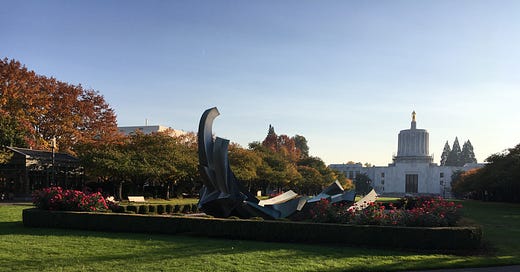Why the Bureau of Labor and Industries Matters
Oregon leaders have codified civil rights in many areas of life, but without education and enforcement these rights are merely rights on paper
When you hear the phrase “civil rights,” what types of images do you see? Maybe marching across the Edmund Pettus bridge in Selma, Alabama, to demand that Black Americans have the right to vote? What about the right of a trans Oregonian to be served in a restaurant? How about, as a woman or non-binary person, getting the same amount in your paycheck for doing the same work as others with equal qualifications? Civil rights look like lots of things.
Civil rights are for everyone. In a free society—a society striving to be fair and just—every person has the equal right to opportunities and the right to protection from unequal treatment based upon who they are. Oregon’s legislature, courts, and civil rights advocates have made incredible strides in codifying our rights, from “equal pay for equal work” to the right to be served by public-facing businesses regardless of your status (age, gender, sexual orientation, religion, family status, religion, national origin, and more).
But what happens next? After the court hands down a decision or the governor signs a bill, what happens? State agencies are tasked with educating and enforcing these newly-explained rights. One agency, the Bureau of Labor and Industries (BOLI), investigates and enforces civil rights in housing and public-facing businesses and worker rights.
If an employer withholds your wages or a cake-baker refuses to bake you a cake for your same-sex wedding, BOLI can investigate, report findings, and levy penalties. You also can take those findings and use them as the basis for a lawsuit. BOLI and other state agencies can deter businesses and employers from violating your rights by imposing penalties based upon those findings.[1]
But, what if you don’t know your rights? What if you don’t know where to go for help? Or, what if the investigation never happens? It is one thing for Oregon’s leaders to pass laws protecting your rights, but if you never know your rights or if BOLI doesn’t follow through, do you really have those rights? It is vital and necessary for BOLI and other state agencies to communicate your rights to you in the ways that you can hear them. It is vital and necessary for BOLI to properly investigate all complaints as quickly as possible.
Civil rights are for everyone, and to make that really truly true, people need to know their rights, businesses need to know their responsibilities, and the Bureau of Labor and Industries needs the freedom and dedication to investigate all complaints, impose penalties to deter, and take the most egregious cases public to raise awareness. With a significant change in state elected leadership by 2023, with state coffers flush with tax revenue, and with a clearer-than-ever need for true equality in rights like fair treatment by police, we must seize this moment to raise the profile, raise the budget, and raise the expectations of BOLI.
I mention civil rights at the hands of police because we struggle in Oregon to adequately address police accountability and oversight. While Oregonians took to the streets to demand police change their ways following the murder of George Floyd by police, we still don’t have a solid mechanism statewide to field complaints of civil rights violations by police.
BOLI does not currently have the responsibility to educate, investigate, and enforce civil rights in a community’s interactions with their public safety officers, but BOLI is your non-law enforcement civil rights agency and as that neutral arbiter, it can and should act as the first stop for complaints about civil rights violations at the hands of police.
Oregon has a duty to protect your civil rights, and a strong and known BOLI is the best tool we have to do this important work. It is your rights and my rights at stake, after all.
Casey Kulla currently serves as a Yamhill County Commissioner and is a candidate for the non-partisan Oregon Commissioner of Labor. He holds two science degrees, and lives and farms on a river island in the Willamette with his wife and two kids. Casey understands that there is more to BOLI than just civil rights. You can reach him at casey@caseykulla.com, find him on Twitter, FB, and IG @caseykulla and you can learn about his campaign at www.kullafororegon.com.




